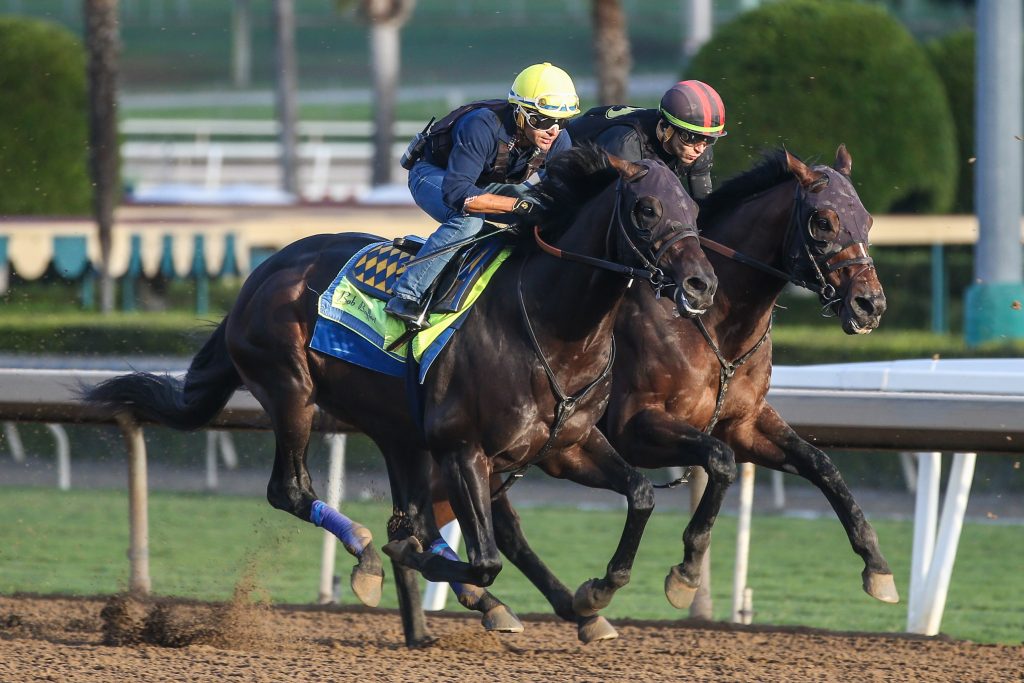
The performance of athletic horses may depend on these factors, including training methods, quality food, adequate supplementation, and well-being conditions. These factors can improve the performance at all stages of an athletic horse’s sporting life.
As the Breeder’s Cup 2022 is quickly approaching, as a trainer aiming to have a horse in the future Breeders Cup with TVG, you may need to understand more about these factors! Below are the four factors that could influence the performance of competition horses:
Training
Efficient performance during high, moderate, and low-intensity exercises requires the correct functioning of the nervous, respiratory, cardiovascular, and musculoskeletal systems. This ensures that the homeostasis of the horse is preserved and maintained during each exercise.
The participation of the autonomic and endocrine nervous systems favors the mobilization of energy reserves, cardiovascular homeostasis control, and body fluids balance during exercise.
The goal of any training is to increase athletic performance by saving other bodily functions. However, the increase in income also depends on several other psychological and physical factors, such as, for example, the animal’s diet and age.
We know that the main objective of training competition horses is to improve performance by increasing cardiovascular capacity during exercise. However, the exhaustive practice of physical activities generates a syndrome known as overtraining.
This syndrome is characterized by excessive training without respecting the body’s recovery time, which triggers several metabolic problems in addition to a drop in sports performance.
A training base must enhance the genetic characteristics in accordance with the sport practiced by the animal. For example, for explosive horses, the work must prioritize fast-twitch fibers, being mainly anaerobic work. That is, the training must be intense and for a short period, about two to three hours daily.
Nutritional Management Of Competition Horses
Horses are herbivorous animals, not ruminants, and their digestive system is adapted to diets high in fiber and low in energy. Consumption occurs in small amounts of food several times a day, with moments of rest in between with a maximum of 2 to 3 hours.
Another peculiarity of horses is that they are very selective in selecting certain species of forage or even just some parts of them.
Low-fiber, high-energy diets fed to horses usually increase the chances of health and behavioral problems as they conflict with the natural diet to which horses have evolved. Therefore, sport horses should receive at least 50% of their diet in quality roughage (pasture, green, or hay), while the other half should include the supplements.
The nutritional management of a competition horse is not an easy task, as it is necessary that the horse meet the energy requirements of an athlete, but without forgetting to maintain the animal’s health.
Some actions may improve the quality of daily nutrition, such as: promoting access to pasture whenever possible and providing a roughage-based diet, allowing the animal to feed several times a day.
Concentrated feed must be fed to horses with great care and caution, always respecting the indicated amount (maximum supply recommendations of 0.4 – 0.5 kg per 100 kg of live weight) to avoid an excess amount and also to avoid triggering any metabolic problems.
When necessary, it is recommended to increase the number of treatments concerning the volume supplied: portions of up to 4 kg (2 times a day), 4-6 kg (3 times a day), and more than 6 kg (4 times a day).
Competition Horse Supplementation
Supplements are provided to improve the performance of athlete horses so that they deliver better results, both in day-to-day training and pre-and post-race moments. However, the focus should not only be on improving performance but also on maintaining the horse’ health.
Food and water intake in adequate amounts are not enough to provide the horse with the needed energy levels. In addition to the energy levels, proteins, minerals, and vitamins are necessary for athletic horses.
Therefore, adding vitamins, minerals, and amino acid supplements to the food routine is essential to meet the demands of nutrients and energy. Supplementation must be done in a balanced and strategic way to avoid excesses.
It is essential to carry out nutritional planning based on the specific needs of each horse according to its breed, age, type of sport it’s participating in, and other specific characteristics.
Welfare
Confinement, travel, and high demand during competitions are stressful factors to which the athletic horses are subjected to, which can cause irritability, anxiety, nervousness and aggressive behaviors.
Maintaining the health and well-being of an athletic horse is important. It is also important that the animal is monitored by a veterinarian and undergoes periodic examinations. This helps to rule out changes that often go unnoticed at first, such as gastritis, skin irritations, teething, ear, spine problems, or mild lameness that may not be easily noticeable by the trainer.
The facility where the animal is located must be suitable for it to stay in, with sufficient space, availability of clean water, adequate cleaning, bedding material, and suitable size of troughs, among others.
Having environmental enrichment strategies and allowing the horse to have visual contact with other animals can improve its well-being. The contact inside a stable is associated with a lower occurrence of abnormal behaviors, such as aerophagia, walking in circles, and even the tolerance for food intake.
Regular exercise, such as a light trot on the lead, can help to minimize the horse’s excess energy and anxiety, even before the planned training. Regular exercise is essential for the horse to have an established routine, reducing anxiety levels.
The association of positive reinforcements with the desired behavior, especially in the animal’s most stressful and challenging moments, makes it more calm and more collaborative in subsequent situations.
Final Thoughts
Having a careful diet, good exercise routines, and a well enough environment can improve the horses’ well-being and, thus, improve how they perform. An animal that works at its top mental and physical capability, with low levels of stress and anxiety, can learn better during training and may even perform much better.
Photo: Ernie Belmonte, Past The Wire



